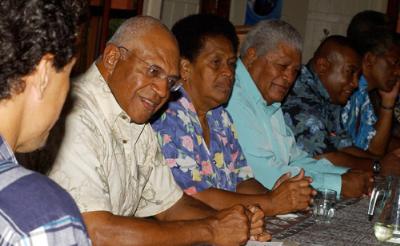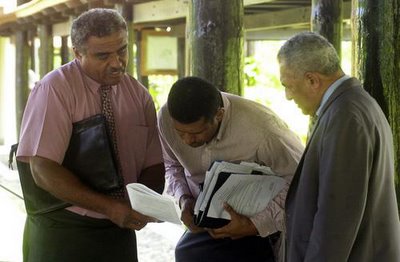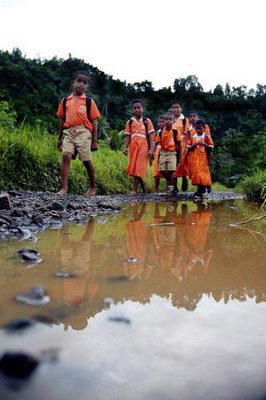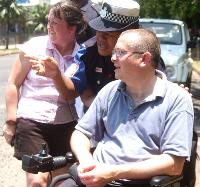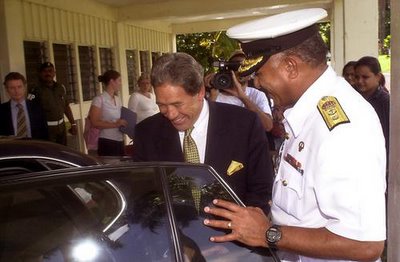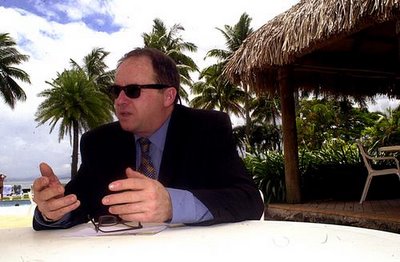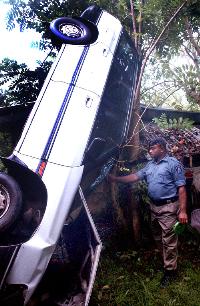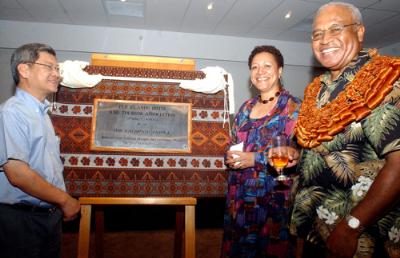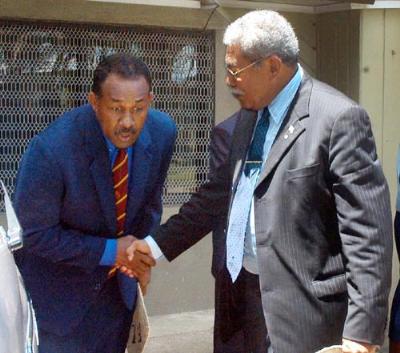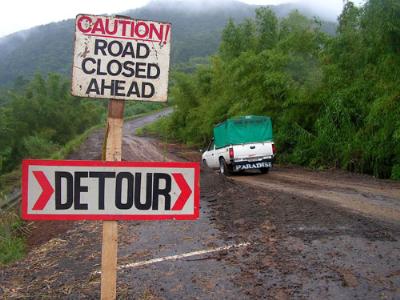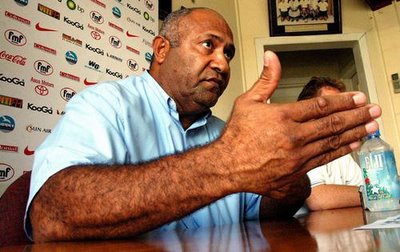
The
merger between S.D.L and C.A.M.V is a
marriage of convenience deeply rooted in Fiji's calamities post 2000 Coup. It is clear that these
elements of danger in Fiji; are jockeying for position, prior to the elections in 2006.
Even the post of President is in contention, by convicted Coup mobster, Messr Jope Seniloli. These Fijian political lobbyist of ill-repute, are
willing to sideline the current Vice-President Joni Madraiwiwi, for an individual intoxicated with nationalism. Albeit, perilous to the social fabric of Fiji.
On cue, Fiji Army Spokesperson
dispatches Commander Bainimarama's intentions of
permanently shelving the controversial R.T.U Bill.
Monasavu Landowners are still awaiting their pound of flesh. Yet the abusive N.L.T.B ponder their issue as well. As if, they're entitled to the Court pay-out. $52 Million is alot of money for Fiji standards. It can be argured that N.L.T.B did spend a great deal of time; contemplating how to access those funds using their Native Lands Act.
NLTB to discuss $52m payout
The Native Land Trust Board will meet next week to discuss the $52m payout to Monasavu landowners. Executive officer Nimilote Naivalumaira confirmed this yesterday. “The issue will be discussed again at our next board meeting scheduled for next week after which we will be able to issue a full statement on the matter,” he said. The Monasavu landowners have yet to receive their $52million compensation payout from the Fiji Electricity Authority.
The Supreme Court ruled that the FEA was to direct the money to the court which would then be directed to the landowners’ lawyer, Tevita Fa. Mr Fa would then distribute the money to the landowners. However, the NLTB raised concern over the procedure in which the money would be distributed. The ruling, it said, was in breach of the Native Land Trust Act which stated that the compensation should be directed to the Native Land Trust Board who would then distribute it to the landowners.
Fiji Sun's Editorial on Friday identifies the single biggest
reason for broken laws in Fiji.
It is rather pathetic to keep churning out Laws particularly when there is no Law enforcement agency; other than the over-extended and under-funded Fiji Police Force. Forcing an
age-limit for Alcohol in Fiji although, it is socially attractive, the exercise itself will be totally confusing and cumbersome without national identification cards.
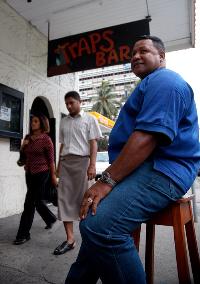
Fiji Times Editorial Fri Feb 17th 2006
addresses the issue.
The legal age
Friday, February 17, 2006
"The legal age that a person can be considered an adult has been the source of constant battles between parents and children over the ages.
In the recent past, many girls were married at 16. These same women are today grandparents of teenagers who face increasingly paternalistic attitudes from the Government.
It's ironic that as we progress into the 21st century, the State's treatment of teenagers has become more and more patronising.
This week the Government will push through the House of Representatives a piece of legislation that has taken years in the making. This law will make it illegal for anyone under the age of 21 to drink in a bar or buy alcohol.
It will allow for the prosecution of bar owners who supply or provide alcohol to anyone under 21 in a bar. The onus will be on the bar owner or his staff to ask anyone who looks close to 21 for identification.
These changes will come through amendments to a Bill to repeal the Liquor Act (Cap.192) and the Liquor Act 2005.
When enacted, the Bill will repeal and replace the existing Liquor Act, which currently allows for those 18 or over to drink alcohol in a bar.
The fine for bar owners who let someone under 21 years of age drink alcohol in their premises will be up to $2000.
In coming to a decision on what limit to put on the minimum legal drinking age, the Government had input from many quarters including a committee that explored all the options.
It was this committee that suggested that a section of the Juvenile Act, which made it illegal to sell alcohol to those 18 or under, be moved into the Liquor Act. Attorney General Qoriniasi Bale admits that the Government took this a step further and decided to not just place it in the Act but also raise the age to 21.
Mr Bale is not worried about having support for limiting the legal drinking age to 21 years or over.
In fact, many churches would support such an initiative, especially given pregnancy rates and other issues said to be offshoots of teenage drinking.
But what the Government is ultimately doing is placing limits on when a person can be considered an adult in this country.
It already denies people over 18 but under 21 the right to vote. Now it denies them the right to drink.
If the Government is so concerned about alcoholism in Fiji, perhaps its resources would be better spent legislating a bit of responsibility among older drinkers, regulating alcohol marketing and enforcing drink driving laws."
 Club Em Designs
Club Em Designs





